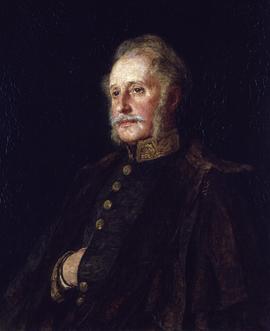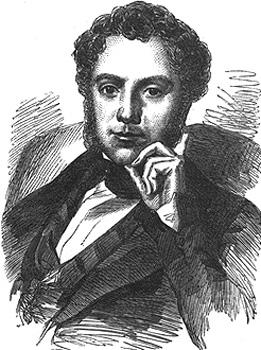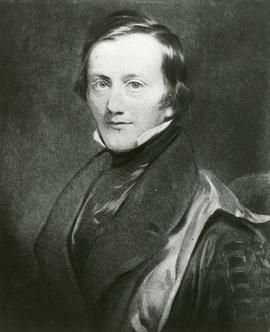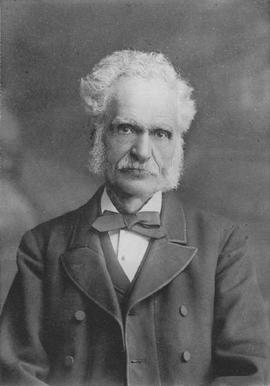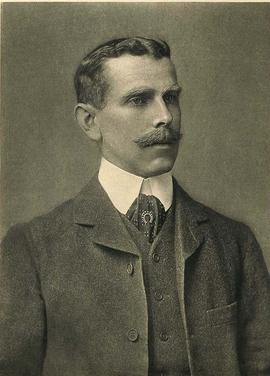Brian Houghton Hodgson is widely recognised for the great progress he made in describing the birds and mammals of Nepal. He wrote more than 140 zoological papers, ranging from descriptions of single species to checklists of the fauna, and presented ZSL with his manuscript notes and drawings
William John Broderip was an English lawyer and naturalist. Broderip throughout his life was an enthusiastic collector, particularly of shells. His collection was ultimately purchased by the British Museum. He was elected a Fellow of the Linnean Society in 1824, of the Geological Society in 1825, and of the Royal Society on 14th February 1828. In co-operation with Sir Stamford Raffles he aided the formation of the Zoological Society of London, of which he was one of the original Fellows
Sir Richard Owen was an English biologist, comparative anatomist and palaeontologist. Owen produced a vast array of scientific work, but is probably best remembered for coining the word Dinosauria, meaning terrible reptile or fearfully great reptile. An outspoken critic of Charles Darwin's theory of evolution by natural selection, Owen agreed with Darwin that evolution occurred, but thought it was more complex than outlined in Darwin's On the Origin of the Species. Owen was the first President of the Microscopical Society of London in 1839 and edited many issues of its journal, The Microscopic Journal. Owen also campaigned for the natural specimens in the British Museum to be given a new home. This resulted in the establishment, in 1881, of the Natural History Museum in South Kensington.
Henry Walter Bates was an English naturalist and explorer who gave the first scientific account of mimicry in animals. He was most famous for his expedition to the rainforests of the Amazon with Alfred Russel Wallace, starting in 1848. Wallace returned in 1852, but lost his collection on the return voyage when his ship caught fire. When Bates arrived home in 1859, he had sent back over 14,712 species (mostly insects) of which 8,000 were (according to Bates) new to science. Bates wrote up his findings in the work The Naturalist on the River Amazons
Gerald Malcom Durrell was a British naturalist, writer, zookeeper, conservationist and television presenter. He founded the Durrell Wildlife Conservation Trust and the Jersey Zoo in 1959. He wrote approximately forty books, mainly about his life as an animal collector and enthusiast, the most famous being My Family and Other Animals (1956). After the war. Durrell joined Whipsnade Zoo as a junior or student keeper
Charles Henry Maxwell Knight was a British spymaster, naturalist and broadcaster, reputedly a model for the James Bond character 'M'. He played major roles in surveillance of an early British Fascist party as well as the main Communist Party. He penned numerous books about natural history and animals. After his death, the Maxwell Knight Memorial Fund was set up, which provided for the Maxwell Knight Young Naturalists' Library in the education centre of the Natural History Museum. After Knight's death, a wildlife memorial fund was established in his name, headed by David Attenborough and Peter Scott
James Maxwell McConnell Fisher was a British author, editor, broadcaster, naturalist and ornithologist. He was an authority of Gilbert White and made over 1,000 radio and television broadcasts on natural history subjects.
Fisher was the son of Kenneth Fisher (also a keen ornithologist and headmaster of Oundle School from 1922 to 1945); his maternal uncle was the Cheshire naturalist Arnold Boyd. He was educated at Eton and began studying medicine at Magdalen College, Oxford, but later switched to zoology. He took part in the Oxford Arctic expedition in 1933 as an ornithologist.
After university he joined London Zoo as an Assistant Curator, and during the war studied rooks for the Ministry of Agriculture. He later became a leading member of the RSPB and IUCN, a member of the National Parks Commission and vice-chairman of the Countryside Commission. He presented the BBC Radio series Birds in Britain from its inception in March 1951 until its end, twelve years later. Fisher was one of the members of the small party that on 18th September 1955 raised the Union Flag and took possession for the UK of the tiny, uninhabited, rock islet of Rockall in the North Atlantic. As well as writing his own books, he was an editor of Collins' New Naturalist series. He was the resident ornithologist in the regular Nature Parliament series broadcast in the 1950s on BBC radio as part of Children's House. He was awarded the British Trust for Ornithology's Bernard Tucker Medal in 1966.
He was married to Margery Lilian Edith Turner, and they had six children, including the publisher Edmund Fisher. He died in a car crash in September 1970. After Fisher's death he was commemorated in two ways. A public appeal allowed the seabird island of Copinsay, Orkney, to be purchased as a permanent nature reserve dedicated to his name. Also, his papers were subsequently purchased by Bruce Coleman and John Burton and presented to The National Archives
John Samuel Budgett was a British zoologist and embryologist. He spent most of his short career on the genus Polypterus (bichir), found in the lakes, river margins, swamps and floodplains of tropical central and western African and the Nile River system. He died to blackwater fever shortly after his return to England. This happened on the very day that he was suppose to deliver a lecture of his work to the Zoological Society of London. He didn't have time to write a report, but he did leave a full set of drawings and specimens. It was left to his friend and colleague John Graham Kerr to interpret them and write the report
Robert Oliver Cunningham was a Scottish naturalist. In January 1866 he was appointed Professor of Natural History in the Royal Agricultural College, Cirencester, but resigned in June in consequence of being appointed by the Admiralty upon the recommendation of Joseph Dalton Hooker, to collect plants as naturalist on board HMS Nassau. His natural history notes and narrative of the voyage was published in 1871 as The Natural History of the Straits of Magellan. In all, Cunningham published 18 scientific papers before 1872, his first which was about gannets was his theses but the others were mainly on his observations from the voyage of the Nassau. He presented some of these papers to the Zoological Society of London and to the Linnean Society. In 1871 Cunninham was appointed Professor of Natural History at Queens College, Belfast where he spent the following 31 years as a university teacher
Naturalist
